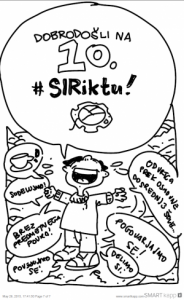Irena Gole, Osnovna šola Bršljin, Novo mesto
When are students responsible for their learning success? How to encourage students to become responsible for their own learning? Does the teacher even have any power to encourage students to become responsible for their own achievements? Formative assessment and testing of students’ progress is a way of teaching, where learners develop the skills that lead to independence and can begin to take responsibility for their own success. Through various activities and with the help of modern technology the teacher directs students to reflect on their achievements, thereby increasing their involvement in monitoring their own learning process and, consequently, their responsibility for their own work and quality performance. This creates a learning environment that encourages students to be more active, to learn in a more effective and committed way, to obtain quality knowledge and take responsibility for it. An important aspect of this is peer participation in all stages of the learning process, as it builds a positive climate in the classroom, where students learn from each other through conversation, deeper collective reflection and through discovery, research and discussion. According to the principle of formative assessment of knowledge, students learnt how to write texts with the characteristics of folk tales in the 5th grade of primary school Bršljin. From a variety of materials and by using different techniques, the students first looked for folk tales and identified their basic characteristics. Then they searched for answers to the question: “How do I know that I wrote a good text with the characteristics of folk tales?” and thereby created evaluation criteria. Through various activities they acquired evidence of learning and practiced giving quality feedback that showed the students their progress. At the same time the students were encouraged to build critical friendships through cooperation and peer evaluation and to question their achievements and how they could be improved. Modern technology was used in all activities as it helped in studying and recording of findings. By using this method of work students have gone through all the important phases of building knowledge – they explored resources, collected and analysed data, studied similarities and differences, made conclusions and discussed the findings. This enabled them to build knowledge through experience, which ensures greater sustainability of knowledge and its application in new situations, for example when writing other types of texts.
